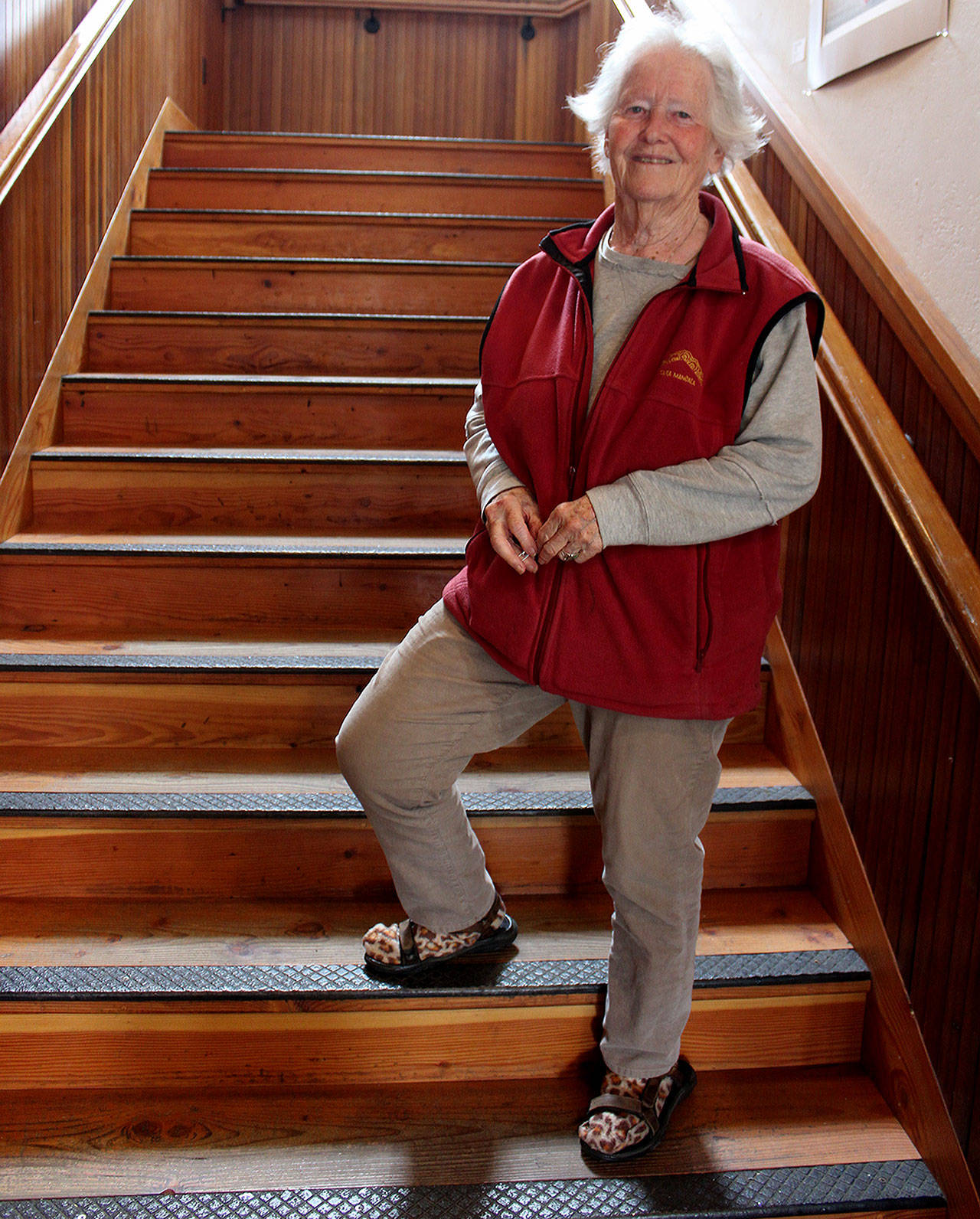Goosefoot.
The name is all over South Whidbey.
Gardens, farms, galleries, historic buildings, senior services, preserved land, workshops, dances, nonprofits, a grocery store called The Goose, even a whacky pet parade.
But what’s a Goosefoot? A plant? A webbed paw to a long necked bird? A company? A charity?
Or all of the above?
“There’s still people who say they don’t know what Goosefoot does, even after 20 years,” said philanthropist and founder Nancy Nordhoff. “So we’re trying to explain Goosefoot. Maybe that will take another 20 years.”
The organization is named Goosefoot after the plant.
“Goosefoot is a family of plants with deep roots,” Nordhoff said. “It seemed appropriate.”
Launching a rebranding campaign about what the funny-named organization does is in the plans as Goosefoot looks back on two decades of good-deed doing. Celebrations begin 6 p.m. Wednesday at its first street dance of the summer.
Goosefoot has given out $630,000 in grants to numerous nonprofits around South Whidbey in the past four years. That’s possible because it takes the profit it makes at The Goose Community Grocer, minus payroll and expenses, and puts it right back into the community.
“It’s because of that, that’s why I shop here,” said Claudia Fuller of Clinton as she checked out organic tomatoes Thursday. “I don’t think many people know where the money goes though. It’s sort of a foreign concept.”
Established as a nonprofit in 1999 through the efforts of Nordhoff and Linda Moore, who was experienced in real-estate law and economic development, Goosefoot is now a major partner in the start up and success of myriad programs, places and properties across South Whidbey.
“We support organizations that support people, our funding helps support other groups to fulfill their missions,” said Marian Myszkowski, director of programs for the Goosefoot Community Fund, which is the organization’s grant-giving arm.
Five years ago, Goosefoot helped launch the South Whidbey School Farms program. This year’s fifth-graders are the first class to plant, harvest and eat fresh produce — peas, lettuce, bok choy, carrots, basil, parsley, pumpkins, potatoes — all through their elementary years. They also learned to cook.
Finishing up a class Thursday, students are told today’s “nibble time” treats are sugar pod peas and carrots. They receive a lesson on how to properly break off peas with two hands and run out to give it a try.
Friends Callahan Dobmeier and Emily Reid are among the first to dig up a carrot each, wash them under the faucet and eagerly crunch away.
“People think kids won’t eat vegetables. It’s not true,” observed farm manager Cary Peterson. “They love to eat the food right out of the garden. It’s direct, it’s clear and it’s real. Kids adore vegetables.”
Without Goosefoot’s support — some $270,000 worth through direct and matching grants over five years — the garden program would be a patch of what it is today, Peterson said.
“So many school gardens are so small, they’re not effective,” Peterson said. “We have 600 kids to educate and feed. You need space to do that, half-acre here and a half-acre at the high school.”
Today, Goosefoot is overseen by a 15-member board of directors, employs four full-time employees and two part-time employees. Administration overhead is approximately 16 percent of its total operating budget.
Goosefoot is the owner of prime commercial real estate property and a landlord to 17 tenants, all within Bayview Corner and Bayview Center.
“I think the biggest impact Goosefoot has had over the past 20 years is our contribution to the revitalization of Bayview on both sides of the highway,” said Sandy Whiting, Goosefoot executive director. “Our long-term investment in purchasing and developing property has resulted in two vital economic and social centers on South Whidbey.”
Its mission is to “build a sense of place and community, preserve rural traditions, enhance local commerce and help create a healthy, sustainable future for South Whidbey Island.”
Nordhoff purchased the historic Bayview Cash Store to save it from a likely wrecking ball and Goosefoot transformed it into a thriving hub of business, art, restaurants and quirky events.
“It was important to Linda and I that we key in on a sense of place and community,” Nordhoff said. “There was a threat of McDonalds coming to South Whidbey, people were getting up in arms.”
In the last several years as The Goose started to turn a profit, it finally made enough money for Goosefoot to turn around and give it away.
“It’s money that’s not going into an owner’s pocket,” Myszkowski said. “It’s not going into a franchise. There’s really nobody else doing economic development like it.”
Goosefoot is also a community savior of sorts, swooping in when bad things happen to good souls.
When the walk-in freezer at Island Senior Resources suddenly went kaput two years ago, its Meals On Wheels program that supplies seniors with 6,300 meals a month was in jeopardy.
Goosefoot came through with a $35,000 check for a new freezer.
“We’re nimble,” said Myszkowski. “We respond to what’s needed in the community. We kind of have the ability to look out and say, ‘How can we help?’”


